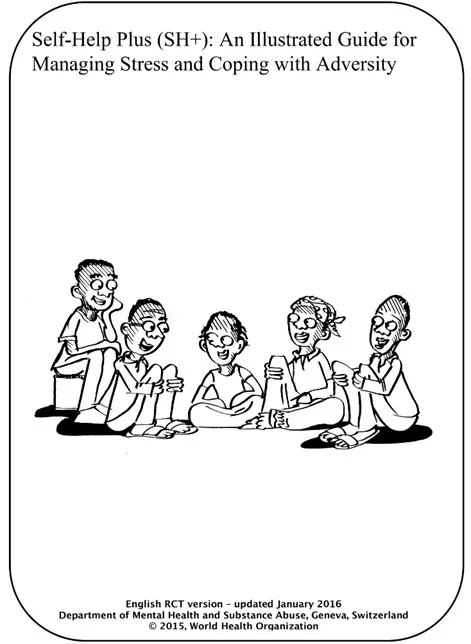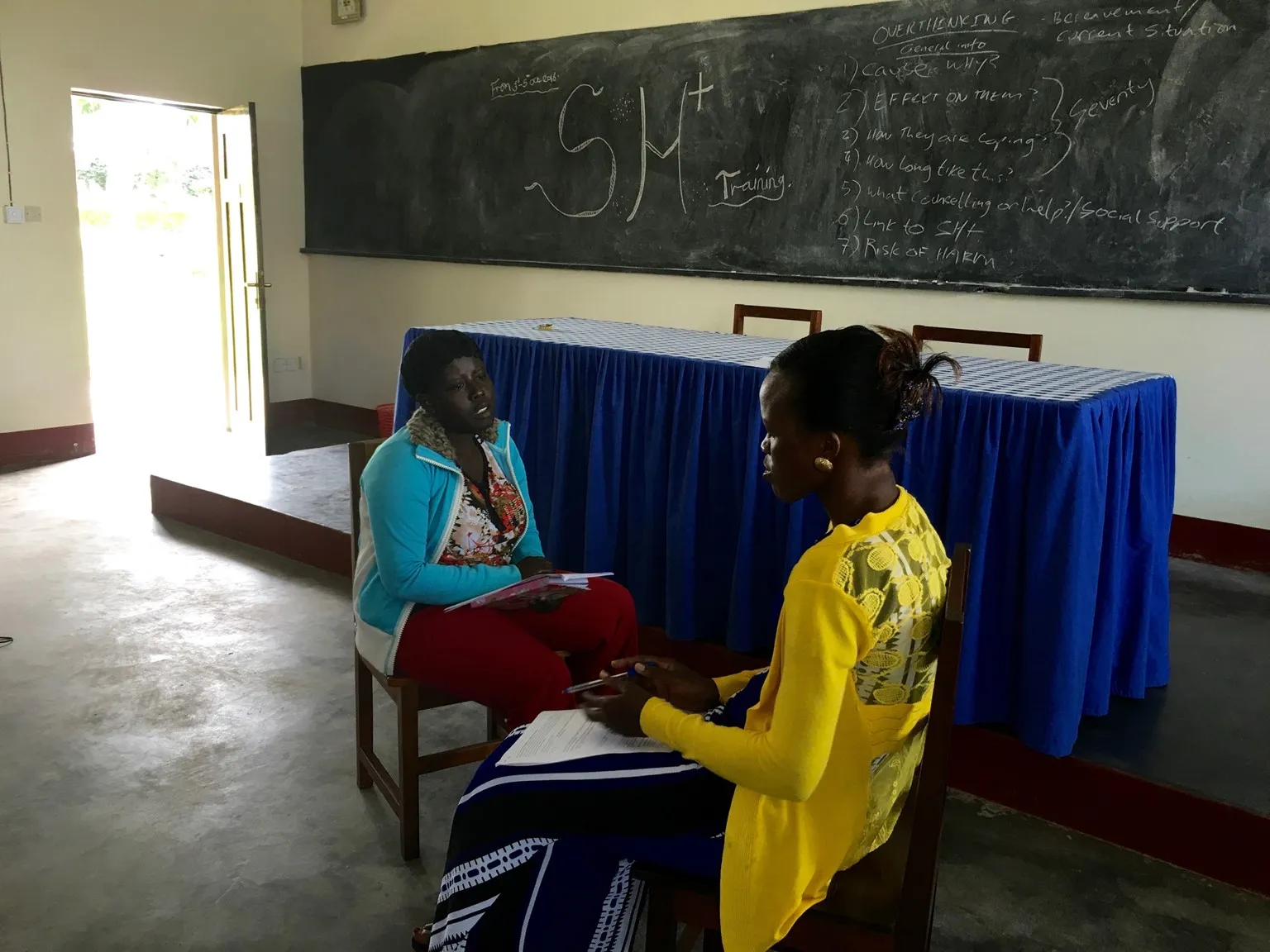Can innovative self-help workshops help meet the immense needs for mental health and psychosocial support amongst refugees?

Why there is a need for MHPSS in Uganda
Uganda is one of the largest refugee-hosting countries in the world, hosting approximately 1.5 million refugees currently. Because of what refugees experience, many refugees can benefit from psychological support. Most refugees live in places where there are few mental health and psychosocial support (MHPSS) services available. An important challenge is that current evidence-based psychological treatments are very challenging to provide in low-resource settings. Such treatments require specialized therapists, and tend to focus on one mental health problem - when refugees often experience different types of concerns. For example, evidence-based psychotherapies may focus only on people that have posttraumatic stress disorder or depression. However, many refugees are distressed in more generic ways: they experience a mix of feelings across different disorders. In order to meet the large need, innovative and scalable approaches are required. That’s where Self-Help Plus (SH+) may be a good fit.
In order to meet the large need, innovative and scalable approaches are required. That’s where Self-Help Plus (SH+) may be a good fit.
Our Solution: SH+
SH+ is a guided self-help intervention, developed by the World Health Organization (WHO), with lots of potential for scaling. It aims to directly address limitations to providing evidence-based MHPSS interventions in hard to reach humanitarian settings with limited resources at a larger scale. SH+ consists of stress management workshops provided by supervised, non-specialist trained facilitators in groups. It uses audio-recorded materials and a self-help book consisting mainly of illustrations. SH+ is aimed at psychological distress broadly.
HealthRight, a global health and human rights organization, has worked with the WHO, Government of Uganda, UNHCR, and other partners to translate, adapt and test SH+ with South Sudanese refugee women in Northern Uganda. The research on SH+ that we have done at HealthRight over the past seven years, including controlled and uncontrolled pilots, and a cluster randomized controlled trial (cRCT) (full article can be accessed here), has shown that SH+ is effective in reducing psychological distress among South Sudanese refugee women in Northern Uganda. Specifically, results from the cRCT showed that SH+ led to a significantly greater reduction in psychological distress not only immediately after the intervention, but 3 months post intervention as well, relative to usual care. Compared to other psychological interventions, SH+ is easier to train and implement, because of its format. Because it reaches 20-30 people in stress management workshops, it can potentially reach larger groups of people at a time. Outside of Uganda, other studies on SH+ among humanitarian populations in Europe and Turkey have also shown positive results from evaluating SH+ with refugees.

Journey to Scale
With these positive results, we applied for funding from Journey to Scale: Funding for Scaling Humanitarian Innovation supported by Elrha. Journey to Scale initially provided us with support to develop a scaling strategy for SH+. We are currently receiving mentoring and support to test and further develop a comprehensive scaling vision and strategy. The process proved to be an eye-opener for us, as our initial approach to bring SH+ to scale involved using a conventional model of implementation and delivery by HealthRight in new contexts. We also considered providing training for staff of other organizations in Uganda. However, the strategy development phase introduced us to other models of scaling up which could be adapted to our context and sensitized us to some of the challenges of conventional horizontal and vertical scaling. After reflections and mentoring support from Elrha, we then developed SH+ 360.SH+ 360 Model for Scaling Up
SH+ 360 is a multi-sectoral model for scaling up, which provides tailored support and facilitates the integration of SH+ into routine programming of partners across humanitarian sectors. In this model, HealthRight does not directly deliver SH+. Rather, we support humanitarian partners as they integrate SH+ into their own existing humanitarian programming. This enhances reach whilst more holistically addressing humanitarian needs. In order to test our approach, we are collaborating with a large humanitarian and development NGO and a governmental partner in Uganda. HealthRight is providing leadership and mentorship across the project cycle (360 degrees – hence SH+ 360), while building partner organization capacity to deliver SH+. HealthRight is also offering technical expertise to partners around selecting, adapting, implementing and monitoring and evaluating SH+ when delivered alongside other programming. The project aims to reach 3000 women, most of which are South Sudanese refugees and Ugandan women living in or around refugee settlements in Northern Uganda.

Lessons Learnt
Our model for scaling up relies heavily on strong partnerships, and we have taken considerable time to build these partnerships, regularly engaging with and getting to know our partners. We have learnt to be adaptable and to take the time to fully understand our partners needs, co-creating a solution that takes their needs into account for implementation. Through these learnings, we have developed a new strategy for partnership and contracting processes specific to SH+360. Our new process involves first co-developing a comprehensive implementation plan and scope of work together with our partners. Using the implementation plan, we then proceed to develop a timeline of activities for work with each partner. The implementation plan and timeline are used for co-development of the budget and contracts. This process has proved to be more efficient in clarifying goals and expectations from the onset, and is helping us to more easily identify areas where further discussion or clarification is needed during the partnership development process. Also, approaches in humanitarian programming are finally moving away from “doing to”, and more towards “doing with”. Cocreation for us at HealthRight is then a very big step in the right direction and we are continuously learning how to do this better through SH+ 360, together with our partners in Uganda.Summing Up: Roadmap to Successful Scaling Up
To reiterate, in order for our SH+ 360 model to be successful, there is a need for strong collaboration with partners, building on shared goals from the outset. The goal of partnering under SH+ 360 is threefold
- To scale up SH+ delivery, reach new populations and more holistically address varied population needs
- Draw on HealthRight’s 7+ years of experience with SH+ implementation and evaluation
- Develop partner internal capacity to fully and independently deliver SH+, while maintaining high levels of implementation quality beyond the testing phase of the Journey to Scale fund
We ultimately aim to build an evidence base for multisectoral integration as a pathway to scaling up MHPSS in the context of real-world programming. As we prepare to enter into the implementation phase together with our partners, we look forward to a mutually fulfilling process of working together.
Stay updated
Sign up for our newsletter to receive regular updates on resources, news, and insights like this. Don’t miss out on important information that can help you stay informed and engaged.
Related articles


.png)
Explore Elrha
Learn more about our mission, the organisations we support, and the resources we provide to drive research and innovation in humanitarian response.